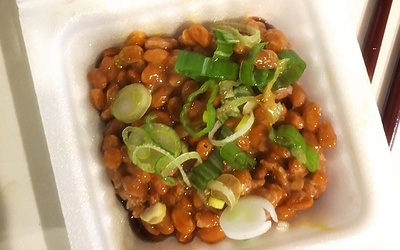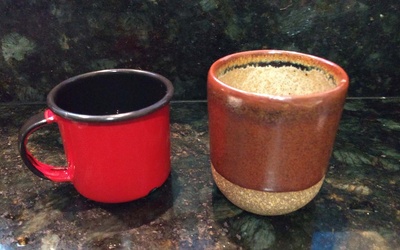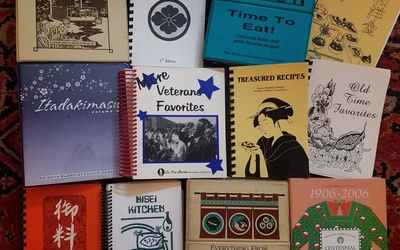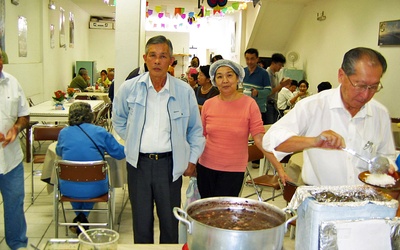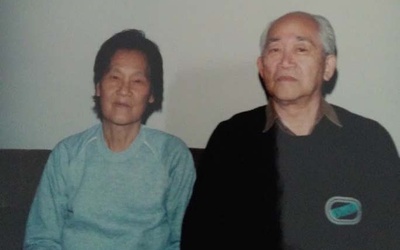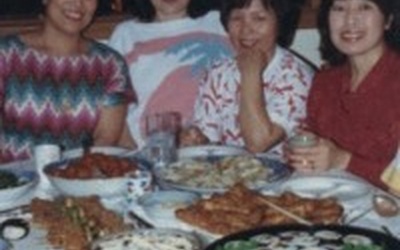Nikkei Chronicles #6—Itadakimasu 2! Another Taste of Nikkei Culture
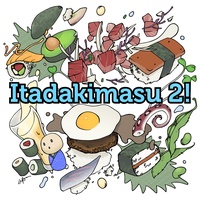
How does the food you eat express your identity? How does food help to connect your community and bring people together? What kinds of recipes have been passed down from generation to generation in your family? Itadakimasu 2! Another Taste of Nikkei Culture revisited the role of food in Nikkei culture.
For this series, we asked our Nima-kai community to vote for their favorite stories and an editorial committee to pick their favorites. In total, four favorite stories were selected.
Here are the selected favorite stories.
Editorial Committee’s Selections:
- ENGLISH:
Matsutake Sukiyaki
By Susan Yamamura
- JAPANESE:
Taking Pride in Spreading Yakisoba From Suzano to the Rest of Brazil – the Tie-up of a Noodle-making Facility and Bunkyo
By Kohei Ohsawa
- SPANISH:
Hard times for Mother, good memories for me
By Milagros Tsukayama Shinzato
- PORTUGUESE:
A Precious … and Delicious Legacy
By Katsuo Higuchi
Nima-kai selection:
- 44 stars:
It All Began at Mrs. Miyoko's Boarding House
By Iraci Megumi Nagoshi
Stories from this series
Natto: A Love Story
Oct. 10, 2017 • Marsha Takeda-Morrison
I love natto. But it wasn’t always that way. My mom gave me my first taste when I was around seven or eight years old and it didn’t go well. I gagged and begged her for a cup of water to wash the bitter taste out of my mouth. “It’s good for you,” she said, but I swore right then that not a single, slimy, smelly bean would ever touch my lips again. Growing up, I put it on the …
Cabbage soup
Oct. 9, 2017 • Heriete Setsuko Shimabukuro Takeda
When Geró was hired to cook for my family, I had no idea of the revolution it would cause in our lives. A native of Minas Gerais, a “hands-on” cook (as she introduced herself), she arrived with plans to please everyone with her wonderful recipes. He came across my mother, who was almost shameless when it came to determining menus. The situation deserves a brief history. There were nine of us then. Father, mother, six daughters and a very strong …
Yes, It Matters: Nisei Cuisine and Japanese American Identity
Oct. 6, 2017 • Tamio Spiegel
I have, for years, advocated the celebration and codification of a uniquely Japanese American culture of eating that I have come to refer to as “Nisei cuisine.” Nisei cuisine is the uniquely American food that developed as the “second generation” (first to be born in the USA) of Japanese Americans, generally considered to be those born between 1915 and 1940, came of age and, post-internment, moved throughout the United States, taking part in the development of the great post-war American …
Hello Again Feijoada
Oct. 4, 2017 • Masayuki Fukasawa
“I enjoyed it for the first time in three years.” In June, 2005, Makoto Oka, (age 66 at the time) chairperson of Brazil Okayama Kenjinkai (prefectural association) commented on the feijoada, a major Brazilian dish, with a face that showed his getting over some past woe. As a matter of fact, Oka almost died from a burn on his body when he turned over a giant pot of feijoada at the kenjinkai hall in the past. Feijoada, a local cuisine …
Palate
Oct. 2, 2017 • Hudson Okada
Even though I was still a child, I easily came to this conclusion: my maternal grandparents' house was so different from the others I knew – until then – that, when I was in it, it was as if I were on another plane. And there were several reasons for this impression: The adults – my grandparents, my parents and my uncles – only spoke to each other in Japanese. My ditchan 's newspapers and books were all written in …
Fried Chicken and Futomaki
Sept. 28, 2017 • Linda Cooper
In the documentary film Fall Down Seven Times, Get Up Eight: The Japanese War Brides, Hiroko Tolbert says, “I’m completely American.” Her daughter Kathryn counters, “You know, it’s funny to say how American you are, yet every morning you make miso soup.” Hiroko giggles, “Well, the food is a different story,” she says, and she and her daughter both laugh…and it is. As we grow older, it seems, my best friend Brenda and I talk about food often. We are …

